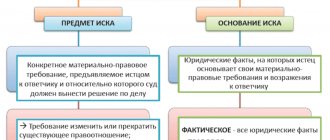Receiving an eviction notice from a residential property is an unpleasant thing. But, as a rule, such a requirement is not news to the addressee.
What should the notice look like, who sends it and how does it deliver it, what should I do if such documents are served? We have answered these and other pressing questions below. But since each situation is individual, the site offers a free “lawyer consultation” service.
:
Notice of eviction from residential premises
Why do you need a notice of eviction from a residential premises?
Issues regarding the use of residential premises are regulated by the Housing Code of the Russian Federation. It is this legislative act that establishes cases when, before filing a claim in court, you should first contact the defendant with a notice of eviction. Only in this case the statement of claim will not be returned with reference to non-compliance with the pre-trial procedure for resolving the dispute. And even if it is accepted, at the court hearing on eviction cases, the judge will definitely clarify whether such a notice was sent.
What documentation is prepared at the beginning of the procedure?
It begins with a statement of claim .
The document is submitted, in accordance with the Civil Procedure Code of the Russian Federation, at the location of the defendant.
The claim must
indicate :
- full name of the court;
- passport information of the evicted applicant;
- requirement to evict (specify legal norms);
- why do you think that the specified person no longer has the right to stay within the walls of the house;
- what pre-trial measures were taken and what results they produced;
- what papers do you use to support your claim?
In addition to the claim itself, the following papers are required :
- identification;
- certificate of registration of the defendant in form -9 (the “age” of the certificate is a maximum of a month);
- state duty receipt;
- registration certificate for housing;
- social tenancy agreement (or order; also - purchase and sale agreement);
- documented evidence of the impossibility of the defendant’s continued residence in the dwelling (for example: the apartment was sold to another person, a transaction agreement will be required);
- copies of the statement of claim in accordance with the number of participants in the process.
It should be remembered that to draw up such a claim, it is better to contact a competent lawyer , because the average person may not take into account insignificant details in his opinion, and they can ruin the whole case. Or the judge will consider the statement insufficiently reasoned, and this will be considered a “point” in favor of the opponent and will give him the opportunity to justify himself.
It also happens that citizens are evicted administratively, without the involvement of judges, but with the appropriate order of the prosecutor.
Read about the eviction of illegal residents here.
This happens in cases :
- unauthorized occupancy;
- if citizens live in hazardous housing.
When to file a notice to vacate a residential property?
The grounds for preparing a written document are:
- the intention of the homeowner to terminate the right of third parties to use his residential premises. As a general rule, when family relationships are terminated, the right to use the residential premises of the former family member of the owner is terminated. Then such citizens must vacate the premises within the period established by the owner
- the intention of the homeowner to terminate the right of use by persons whose right is established by a court decision (on recognition of the right of use, recognition as a member of the owner’s family), on the basis of a testamentary refusal. In this case, an eviction notice is prepared when the user uses the apartment for other purposes, violates the rights and legitimate interests of neighbors, mismanages the living space, and allows its destruction. The user warns of the need to correct deficiencies in a timely manner. And if they are not corrected, you can file a claim
- eviction of a temporary tenant. Such persons must vacate the premises within 7 days from the date of notification by the tenant (unless another period is established by the tenant)
- eviction of tenants under rental and sublease agreements
- requirement of a bailiff under a writ of execution within the framework of enforcement proceedings.
Notice, demand, warning - what are their differences?
Even from the names themselves it becomes clear that these are three different documents. Therefore, before you begin to compile any of them, you should understand what purpose each of them serves and what it represents from a legal point of view.
Warning
If a tenant behaves inappropriately or violates the terms of the lease agreement, the owner of the residential premises must warn the tenant that his behavior is unacceptable. For example, if a tenant has committed any violations of a technical nature (changed communications, moved a partition, etc.), the owner of the apartment sends the tenant an initial pre-trial claim - a warning, where he invites the violator to eliminate everything at his own expense.
Usually, the owner of the residential premises gives a certain period of time to correct the violations committed by the tenant. And only if the tenant ignores the warning, the owner of the residential premises can proceed to the next stage of pre-trial resolution of the dispute - sending the tenant a demand for eviction.
For example, citizen Ivanov rented out his apartment to citizen Petrov. For the first six months, the tenant behaved calmly, but then the neighbors began to complain to the owner about the constant noise in the apartment, music was playing loudly at night, screams and the noise of a fight were constantly heard from the living room.
Ivanov sent his tenant a warning about the inadmissibility of such behavior and a demand to stop disturbing the peace of the neighbors. Otherwise, he reserved the right to forcibly evict the troubled tenant through the court.
Petrov heeded the warning and stopped gathering noisy groups in the apartment, thereby saving himself from the need to look for other housing, and his neighbors from the need to complain to the owner of the apartment. This was the end of the incident.
Requirement
But tenants do not always take into account the warning from the owner of the premises. Or another reason for eviction occurs, for example, the expiration of the rental agreement or the owner of the apartment decides to sell it. In this case, the owner of the residential premises informs the residents that they must leave the premises and gives them a certain period of time to find new housing.
For example, the owner of a two-room apartment rented it out, but a year later he urgently needed money and decided to sell the property. He sent a registered letter to the tenants demanding that they leave the premises within a month in connection with its sale.
The tenants were unable to find suitable housing within a month and turned to the owner with a request to postpone the eviction for another month. Since the buyer agreed to postpone the eviction of the residents, having entered into their difficult situation, the seller also did not object and allowed the residents to stay in the apartment for another month.
Notification
The notice is given to the tenant after the court decision has been made and it has entered into legal force. It must contain the reasons for the eviction and a reference to the court decision that has entered into force. It is impossible to challenge the notice, as well as to extend the eviction period specified in the notice. If the tenants ignore the notice, the owner of the residential premises may apply to the SSP for forced eviction.
For example, citizen Khovansky entered into a residential lease agreement with the owner of a country house, Nikitin, for a period of one year. But neither a year later, nor after another three months after the expiration of the contract, he did not intend to move out, and Nikitin did not intend to renew the lease.
The owner sent the tenant a demand to evict and set a deadline for vacating the house - within one month from the date of receipt of the document. Khovansky ignored the demand. Then Nikitin filed a lawsuit for eviction and won the legal dispute. After receiving the court's decision, he sent the defendant a notice to evict from the country house within five days.
Khovansky ignored this notice too. The plaintiff was forced to apply for the opening of enforcement proceedings to the SSP. The offender was forcibly evicted with the help of bailiffs and police.
Contents of the document
We recommend that the eviction notice be in writing and delivered to the owner either in person (you can draw up a Refusal Signature Certificate) or with a postal return receipt. These documents will be useful in court as evidence in a civil case. After all, a person can only be forcibly evicted through a judicial procedure.
The document will be given legal force by the following information:
- about the notification recipient
- about the sender of the document
- Name
- reason for eviction: termination of the right to use, violation of rights and legitimate interests, use of the premises for other purposes, etc., with references to regulations
- the period within which the premises must be vacated
- date and signature.
It is not difficult to draft an eviction notice, unlike the procedure for judicial review of such categories of cases.
How to compose?
When drawing up documents, you need to pay attention to the features of their preparation, methods and deadlines for submitting each of them.
Notification
A notice of eviction from an apartment is sent to the tenant after the completion of the proceedings and a court decision.
The text of the paper contains the following information::
- passport details of the homeowner and tenant;
- the address of the premises from which the person is being evicted;
- reasons for eviction, indicating the date and number of the court decision;
- the time frame within which the apartment/house must be vacated;
- signature of the originator and date of execution.
When drawing up a notification, it is recommended to include all information about the premises (street name, house number, building number, entrance, floor, apartment) in the text.
The deadlines specified in the document are final. If the apartment (house) has not been vacated within the prescribed period, the owner has the right to contact the police or bailiff service with a writ of execution (Chapter 4, Article 24-29 of Federal Law No. 229 “On Enforcement Proceedings”).
The notice is delivered to the debtor or his family members in person against signature . If a document was sent by registered mail with an acknowledgment of delivery, then it is considered received if the addressee signs for it.
Requirement
There are two types of requirements:
- Notice - is drawn up to notify tenants that they need to leave their housing. The reasons for drawing up a document may vary from inappropriate behavior to the sale of an apartment.
- Compulsory – a document of a more persistent nature. In such a document, the owner of the residential premises sets strict conditions: comply with the terms of the rental agreement for the residential premises or vacate the apartment.
The requirement does not have a unified form. The paper is compiled randomly. Its structure is similar to a warning, but without the possibility of extending the period of residence in a residential area.
When drawing up a demand, it is necessary to indicate in the text of the document that if the claim is ignored, the owner has the right to write a statement of claim to the court in accordance with Art. 35 Housing Code of the Russian Federation.
There are three methods of transferring paper to the tenant:
- Postal telegram . Transferred if the housing is located in another city. The owner comes to the post office, makes a claim and certifies a copy of the telegram (with notification of receipt). A copy of the telegram is issued 2-3 days after sending the telegram.
- Ordered letter . Sent by mail with notification of receipt and a list of attachments compiled by a post office employee. The inventory is drawn up in two copies - the first remains with the sender, the second is delivered to the recipient.
- Delivery in person . When handing over personally, the property owner makes two copies of the document. The recipient signs one of them.
The optimal way to deliver a document is to send a registered letter, because in this case you can find out for sure whether the addressee received the message or refused to receive it.
Warning
A warning is sent to the tenant when he behaves in a manner that is inappropriate from the point of view of the owner of the square footage.
When drawing up a document, it indicates:
- passport details of the apartment tenant;
- information about ownership indicating the date of registration;
- basis for using housing (family relations, rental agreement, etc.);
- deadlines for the stay (if they were agreed upon in advance);
- conditions, subject to which you can live in the apartment in the future;
- the date by which you must leave your home;
- date and signature of the owner with transcript.
In addition, the author of the document warns of his intentions to go to court if the requirements are ignored.
The time frame provided for correcting violations must be reasonable.
You can transfer the paper to the addressee in the same ways as other eviction documents.
Evicting people living illegally is not easy. Despite the fact that private property is inviolable, the owner will have to go through more than one authority. Our experts have prepared materials on the procedure for eviction from residential premises of former owners, a registered person, minor children, an unwanted neighbor from a communal apartment, for debts on housing and communal services, mortgages and other loans, neighbors who interfere with life, a former or current spouse or cohabitant, from public housing.
Is it possible to evict a person from his only home?
Judicial practice shows that a citizen can be expelled from an apartment even if it is the only place to live. The scope of application of such a measure depends on the status of residential real estate.
From my own
The hardest thing is to leave the owner of the apartment without an apartment. According to Article 446 of the Code of Civil Procedure of the Russian Federation, he cannot be deprived of housing, which is the only one suitable for living. The Constitutional Court of the Russian Federation clarified that such residential real estate falls under property immunity (Resolution No. 11-P dated May 14, 2012).
Eviction of citizens from their own homes is carried out in exceptional cases. Thus, it is impossible to live in an apartment if it is confiscated for government needs, is subject to demolition, or is declared unsafe. In exchange for the previous residential premises, the owner is provided with equivalent real estate or monetary compensation.
The Ministry of Justice proposed to specify the procedure for confiscating the only residential property from the owner. It is planned to supplement the law on enforcement proceedings with Article 78.1. Property will be confiscated only to fulfill demands for alimony, compensation for health damage, in connection with the death of the breadwinner caused by a crime.
From the municipal
Citizens living in a municipal apartment on the basis of a social rental contract are at risk. Articles are devoted to the issue of eviction from an apartment - Housing Code of the Russian Federation. Since the tenant only has the right to use rented housing, he is allowed to be expelled from municipal housing even if it is his only place of residence.
With the provision of comfortable housing
In the case where the eviction is carried out in connection with the recognition of residential real estate as unsafe, its seizure for state needs, or due to other objective circumstances, the tenant is relocated to another equivalent place of residence.
With the provision of other living quarters
If a tenant does not pay for utilities and the use of residential real estate for more than six months, he may lose his only place of residence for debts. In exchange, they provide another living space with a smaller area.
Without providing other residential property
A tenant may be left without a place of residence if he systematically encroaches on the interests of his neighbors, does not comply with the rules of residence, or neglects his property. By court decision, he is expelled without being provided with another apartment.
From official
A service apartment is provided to an employee for the duration of his work in the organization. After termination of the employment contract, he must vacate the premises. A citizen can be evicted early if he violates the rules of residence, damages property, or has utility debts.
From mortgage
The apartment may be repossessed for mortgage debts. When concluding a loan agreement for the purchase of residential real estate, a pledge is imposed on it in accordance with the mortgage law. It serves as security for the debtor's obligation to the bank. In case of debt, the credit institution has the right to apply to the court to foreclose on the housing.
The Supreme Arbitration Court of the Russian Federation takes the position that the mortgagee has the right to claim a mortgaged apartment regardless of whether the debtor has other real estate or not (Resolution of the Plenum of November 26, 2013 in case No. A65-15362/2009-SG4-39).
Options for resolving the eviction problem
Not all residents are persistent and do not want to leave the premises. For most, receiving a notice that sets out requirements to leave the premises is sufficient. If necessary, they can be argued by citing facts and evidence of violation of the rules of residence or making regular payments.
Pre-trial settlement of the eviction problem is mandatory for municipal premises that are provided on social rental terms. In other cases, the requirement may be of a notification nature. Having such a document will be useful if the resident does not want to leave the premises and has to go to court.
Demands to leave residential premises should be particularly carefully argued in cases of violation of the rules of residence or violation of the rights of neighbors in an apartment building (apartment building). The debate about what is normal varies among different people. Even violation of the silence regime in the evening and at night, as well as on weekends and holidays, is interpreted by many solely based on their own interests. The same applies to the rules for keeping animals, smoking in common areas of apartment building owners, and using apartments for purposes not intended for living.
In such cases, the presentation of the demand must be preceded by documents (acts) recording a specific violation, preferably certified by witnesses or officials of the police, housing and communal services.
Causes
In addition to the above reasons, there are many other reasons for eviction of tenants:
- failure to comply with the terms of the contract;
violation of the rules for using/residing in an apartment/house in accordance with Article 103 of the Housing Code of the Russian Federation, Article 83 of the Housing Code of the Russian Federation.
The provisions of the tenancy agreement are fundamental for residents, so it is necessary to carefully study the document itself so that there are no misunderstandings or disagreements.
As a rule, the agreement is concluded for a certain period, but if it is not specified, the owner can terminate it at any time, usually by notifying 3 months in advance.
Often, a family living in a property buys a new one after some time and voluntarily terminates the agreement, but there are many cases when the initiative quite naturally comes from the owner himself.
As a rule, the main reasons for such a decision are listed in Art. 83 Housing Code of the Russian Federation:
- Violation of peace, legal rights and interests of neighbors in accordance with Art. 83 Housing Code of the Russian Federation, when music plays at night, rowdy behavior, hooliganism, and loud noise occur. This, naturally, interferes with normal rest and sleep near the people living there. Eviction is also possible in situations where the tenant or one of his family members deliberately damages the property of neighbors, commits vandalism, hooliganism, etc.
- Deliberate damage to property or apartments, either by the residents themselves or by other persons for whom the residents are responsible, which makes the premises unsuitable for further residence or requires significant costs for major repairs.
- Failure to pay utility bills for more than 6 months, which prompts the owner to evict the tenants, but the tenant can prove that payment was not made for valid reasons (illness, late wages at work, etc.).
- Use of the premises not for residence, but for other purposes (business activities, parties, holidays, etc.).
The legislation contains all possible reasons for eviction, but there is another important point: if a person has violated the terms of the agreement, then the owner has the right to evict him, and if the agreement provides for its early termination, then in the event of failure to fulfill certain conditions or simply on the initiative of the owner, the tenants are evicted.
Naturally, the reasons may also be purely individual, which cannot be provided for by law.










